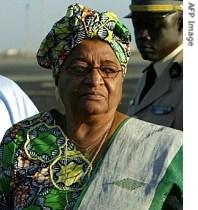2006年VOA标准英语-Liberia Prepares for Rebirth of Logging Industr(在线收听)
By Kari Barber
Dakar
19 December 2006
Liberia is preparing to allow logging, following a three-year, U.N.-sanctioned export ban. The post-war government has passed new logging legislation intended to prevent corruption and mismanagement, but some conservation experts say it is unclear how the law will be implemented and what role local communities will play. Kari Barber reports from our West Africa bureau in Dakar.
 |
| Liberian President Ellen Johnson Sirleaf |
Under the previous Charles Taylor administration, logging provided about half of Liberia's revenue. A U.N. panel of experts accused Taylor of using logging revenue to supply arms for civil wars in Liberia and Sierra Leone.
Forests were being harvested at rates far exceeding sustainable levels, and concessions were based on patronage, not fair bidding, according to timber experts.
Timber specialist Art Blundell was on the U.N. panel that recommended the ban. He says the three-year halt allowed experts to review the logging sector.
Blundell says none of the more than 70 logging companies operating in Liberia had proper documentation and legal status to operate.
"They were not paying taxes; there were gross human rights violations; there were violations of environmental regulations, so it was clear that business as usual was not conducive to the future of the country," he said. "That is why it was so crucial there was this new law and a new start to the sector."
Under the new law, requirements include proper planning to decide what areas should be logged, competitive bidding, provisions to make sure logging company security forces do not operate as militias, transparency of financial reporting, tracking logs from harvest to export, and consultations with local communities.
The government says 30 percent of money earned from leased timber concessions will go to nearby areas for schools, health needs and other social services.
Blundell says the law is a big step forward, but it is only as good as its implementation. He says how local communities will receive their promised benefits is still unclear.
"In the past the money was meant to go back to the communities, and the communities never saw it," he added. "The law requires the money to go back to the communities although it does not specify exactly how it should happen. But that will be taken up in a regulations that governs that, so there is an opportunity for those to be modified to make sure they work."
Stephen Vandermark, of the environmental group Fauna and Flora, says that although the new forestry law recognizes local communities should be involved in dialogue with logging companies, it does not specify how.
"At this point in time it is not obligatory for a logging company to actively engage with a local community, and it is not clearly defined how logging companies could engage with local communities and how local communities could have, for instance, right of use and right of resources in communal forests and logging concessions," he said.
Vandermark says creating the law and lifting the ban were essential to the revitalization of Liberia's economy. Now, he says, international organizations need to be diligent in monitoring the process and continuing to push for responsible use of Liberia's timber.
"They do need the lifting of the timber sanctions quite urgently," he added. "The question, of course, is whether the international community will continue to lobby for a forestry act that will allow for more sustainable management of the forests in Liberia."
Before the ban, the experts say logging grossed about $100 million in revenue each year.